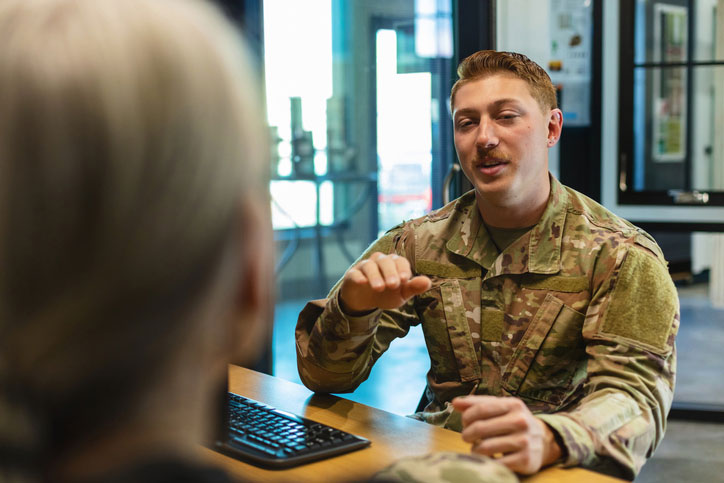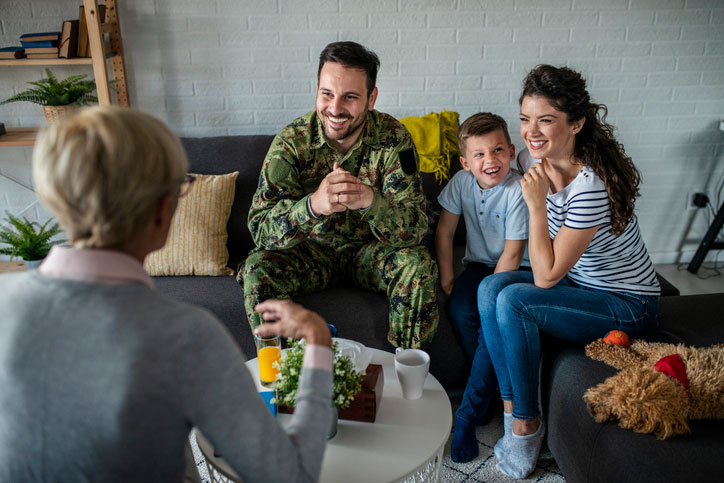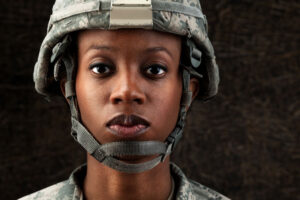Written by Scott Wilson

While any civilized society has a duty to care for and support all of its citizens, there’s a special obligation owed to those who are serving or have served.
Volunteering in defense of society itself is a risky proposition, but one without which the country would not exist. Many have paid the price. Data from the U.S. Census Bureau from 2022 shows that some 30 percent of veterans living in New York have a disability, versus half that number for the civilian population.
According to U.S. Department of Veterans Affairs data from 2020, New York has the fifth highest number of veterans in the population among all U.S. states.
Those injuries were often suffered in the defense of their country. While healthcare is a major part of the mission of the Department of Veterans Affairs (the VA), though, it’s only part of the story. Both veterans and active duty service members in New York face not only the same challenges as any individuals going through life, but also some unique challenges that come through their service.
That service was on our behalf. That means that their challenges are our challenges.
The Confluence of Factors That Make Military Social Work a Field of Growing Importance
The luckiest military service members are those who come home to grow old. But age is an obstacle of its own, one that is coming fast to many American vets.
Vietnam-era veterans represent the single largest group of former military members in society today. Nearly 240,000 of them are New Yorkers. They are also largely members of the Baby Boom generation, the cohort that is currently over the age of 60 and experiencing all the health and mental wellness issues that come with that age.
Adding to those challenges are often the artifacts of service that can effect veterans of any era: post-traumatic stress disorder, ongoing effects from combat injuries, and exposure to chemical agents with long-term consequences like Agent Orange or biowarfare inoculations.
To fulfill the promise made to those who serve, military social work specialists across New York step up every day. More are needed.
What Is the Role of Social Workers Serving Military Veterans?
Social workers have a deep toolbox for dealing with all the various kinds of challenges that veterans and even active duty service members may face. More importantly, they have the big-picture perspective on how those issues may be connected or mutually reinforcing, and can develop solutions to address all aspects of poverty, disability, or simply reintegrating with society after discharge.
Military social workers also offer services to reserve and National Guard members in addition to veterans and active duty personnel.
While many of the challenges for military members and veterans are psychological and can be treated by social workers in direct clinical counseling, anyone who has dealt with the big green machine that is the American military will recognize that paperwork is often half the battle. Social workers, who have case management and referral expertise in spades, can help vets work their way through a stack of forms, verifications, and other obstacles to receiving treatment.
New York military social workers can also point vets toward state benefits they might not have known about, like reduced fees for vehicle registration, a free E-ZPass, free state parks entry, or reduced cost hunting or fishing licenses.
As painful and challenging as all this can be for service members themselves, it’s the families of those brave men and women who are most often overlooked. Social workers have expertise in providing care and assistance to families whose loved ones are deployed in dangerous places for long periods or who have been injured or killed.
Soldiers, sailors, airmen, and Marines all live by a code requiring discipline and obedience. This can make them uniquely vulnerable and unable to advocate for themselves even when they are in dire need. That creates a situation where military social workers often serve as their voice. This can happen on the individual level, when lobbying a command for services or assistance, or at the macro level, calling for more stringent protections, better benefits, or more oversight over troops in need.
MSW Degrees in New York with a Specialized Focus in Military Practice

With major installations like Fort Drum and West Point located in New York, you’ll find that local colleges with social work programs have stepped up to the plate to help offer the unique education that military social work roles demand.
For the most part, this happens at the master’s level, through degrees such as a Master of Social Work in Military Practice or a Master of Social Work in Military Culture & Mental Health Practice.
Classes that build expertise in this role include:
- Social Work Practice with the Military
- Coping With Loss
- Trauma-Informed Social Work Practice
- Clinical Practice with Military Families
All MSW programs in New York come with field experiences to help drive home the lessons of the classroom in real-world scenarios. In these specializations, you can expect to have placements that will put you in contact with service members, veterans, or their family members.
Dealing with the paperwork that is endemic to military life, or performing case management and advocacy work doesn’t require a social work license in New York and can be done by social workers with only a bachelor’s degree. The Bachelor of Social Work is also widely available in the state and comes with the kind of essential, foundational knowledge and skills needed to be successful in mezzo social work practice.
Best of all, you can build on a BSW with an Advanced Standing Master of Social Work degree available at many New York universities. An Advanced Standing MSW takes only a year to complete, versus the two years for a standard MSW. That offers a fast-track to delivering advanced services to veterans and service members in New York.
Finding Professional Certifications To Advertise Your Expertise in Military Social Work
As with many other social work roles, there are various professional certifications available for military-focused social work. These aren’t official credentials from the state, but rather independent assessments of skills and capabilities from third-party organizations with social work expertise.
NASW, the National Association of Social Workers, is the biggest and best known of these organizations. They offer two certs that are particularly relevant to military social work practitioners in New York:
- Military Service Members, Veterans, and Their Families - Advanced Social Worker (MVF-ASW)
- Military Service Members, Veterans, and Their Families - Clinical Social Worker (MVF-CSW)
Both of these are only available to MSW graduates who have current licensure and at least 2 years of documented experience working with the population (3 years for clinical certification). Some additional continuing education specific to military practice is also needed.
These certifications tell vets, active duty service members, their families, and potential employers that you are serious about and seriously qualified to provide social work services in this role.
Organizations in New York That Hire Social Workers With Military Expertise
Veterans are woven through the population of New York in every part of the state and at every step on the socioeconomic spectrum. Vietnam vets sleep on the streets in the city in disproportionate numbers every night; World War II vets populate nursing homes and retirement facilities in small towns upstate; younger vets from Afghanistan and Iraq struggle with addiction issues in places like Buffalo and Niagara.
There’s no shortage of need for military social workers in almost every area of specialized practice across New York state – from substance abuse and mental health to services for the unhoused.
There are many civilian agencies and organizations that may hire military social work specialists to deal with a subset of their target population that may be active duty or veterans. New York social service providers as diverse as public defenders offices, homeless outreach services, or hospitals often look to hire at least some social workers who have expertise in dealing with military matters.
With more than a half-million veterans living in New York, not to mention more than 20,000 active duty service members stationed here, it’s not unusual for social services providers in any field to encounter them in the normal course of work.
The military healthcare system itself hires some social workers. Tricare, the Department of Defense program that provides civilian healthcare benefits to military personnel, dependents, and eligible retirees and reservists, employs military social workers as case managers and therapists.
Military Social Workers Who Are Service Members Themselves
 While you don’t have to be in the military to be a military social worker, the Armed Forces do have billets for soldiers who are also social workers.
While you don’t have to be in the military to be a military social worker, the Armed Forces do have billets for soldiers who are also social workers.
In the Army, a MOS (Military Occupational Specialty) 73A Social Worker holds an officer rank and offers direct services that help improve the mental well-being of soldiers and their families. Navy social workers, who also serve the Marine Corps, are also officers who provide support to service members and families who are on deployment or who need advocacy or crisis intervention. Air Force Clinical Social Workers fill a similar role.
Qualifying for these positions happens outside the standard New York state licensing process, but is similarly stringent. A Master of Social Work is still required, on top of the other strict qualifications needed to become a military officer.
While it’s not the most common path to military social work, practice as a uniformed member of the services delivering social work does give you an element of connection with your clients that contracted civilian social workers can’t easily achieve. Sharing the lived experience, the training, and the concerns of your clients can be a powerful advantage for any kind of social worker. For military social workers, this is the only way to get it.
Veterans Affairs Social Work Jobs in New York
The 900-pound gorilla in military social work jobs, however, is the Department of Veterans Affairs. With more than 20,000 social workers on staff nationwide, it’s the largest single employer of social work professionals in the country.
VA social workers handle the full spectrum of social work responsibilities, from palliative care to housing services to mental health counseling. With facilities across the state, there are positions available almost everywhere. Federal benefits are excellent, and once you are in the system, transferring to other positions is fairly easy.
No matter how you choose to step up, the thousands of veterans in New York deserve your assistance. With the right education behind you, you too can serve the needs of your state and your country.
